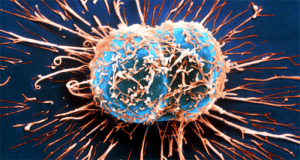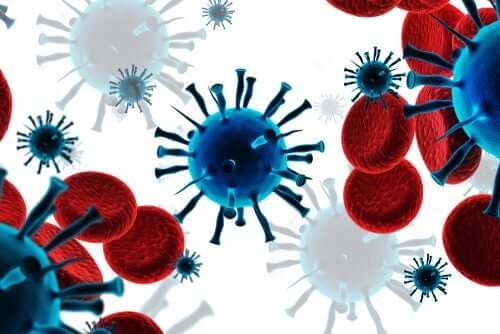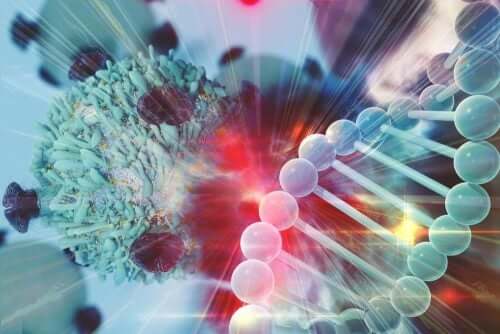How the Immune System Fights Cancer

The immune system is a complex defense system whose main function is to protect the body from external agents. Therefore, it’s important for it to be able to differentiate its own components from external ones. This is how the immune system fights cancer.
Similarly, the immune system is also able to identify and fight its own cellular components. This occurs when these components are abnormal. This is the case of cancer cells, which differ from normal cells.
It’s important to understand that, in all types of cancer, the disease process consists of some cells of the body dividing uncontrollably and spreading to nearby tissues. Cancer is a dangerous disease, which is why it’s very important to have professional help to fight it properly.
Functions of the immune system

In addition to recognizing and fighting tumor cells, the immune system also has other ways to prevent their appearance.
- It protects the body from viral infections that can lead to the appearance of tumors. For example, this is the case of human papillomavirus (HPV). It also fights others with great mutagenic potential, which means that their infection may alter the genetic material of cells.
- It fights by eliminating external pathogens. When there’s an infection, the body responds by developing inflammation around it. However, this swelling should be resolved effectively, because this environment can occasionally lead to the appearance of tumors.
- Identifies and kills cancer cells. It does this through specific markers.
Surface antigens
But how does the immune system recognize cancer cells? The answer lies in some surface proteins present in all cells, called surface antigens.
The surface antigens of tumor cells are different from those of normal cells. Thus, the cells of the immune system can recognize these antigens and detect when they correspond to a mutated cell.
The immune cells are capable of performing that recognition task are T lymphocytes. These cells have a number of receptors that detect surface antigens.
If you want to know more: Nutritious Food Choices When You Have Leukemia
How the immune system fights cancer: the immune cycle

The immune system’s response to cancer starts with the recognition of mutated cells, thanks to the aforementioned surface antigens. These antigens are examined by T lymphocytes, present in the lymph nodes.
After this, the T lymphocytes undergo a series of changes and then activate. This gives them the ability to travel to the blood vessels. Through them, the T lymphocytes reach the tumor directed by concentration gradients of certain signaling molecules.
Once they reach the area of the tumor, the T lymphocytes infiltrate said region in order to attack. Here, they recognize the tumor cells that have certain proteins on their surface and proceed to destroy them.
They do this by stimulating another series of immune system cells. For example, Natural Killer (NK) cells or macrophages.
This article may interest you: Scientific Advances Develop Vaccine Against Cancerous Tumors
Escape mechanisms of tumor cells

The reason for the development of cancer, in spite of immune system action, is that some cancer cells have accumulated so many mutations that they have mechanisms to prevent immune system action.
These mechanisms allow the tumor cells to hide from the immune system. For example, hiding the surface antigens that could be recognized by the immune system.
In these cases, the immune system can fight back thanks to Natural Killer cells. These cells are capable of detecting when a cell has lost its own surface antigen. Thus, they recognize it as foreign and eliminate it.
Another mechanism that tumor cells can use to avoid immune system action is to produce chemical messengers with inhibitory action on the immune cells. Thus, they create immunosuppression around the tumor. This favors the survival of cancer cells.
For these reasons, the main goal of immunotherapy is precisely to help the immune system fight abnormal cells. This can be achieved with adjuvant therapy, which uses antibodies directed at tumor cells in order to favor their elimination.
All cited sources were thoroughly reviewed by our team to ensure their quality, reliability, currency, and validity. The bibliography of this article was considered reliable and of academic or scientific accuracy.
- American Cancer Society, & Society, A. C. (2010). cancer facts & figures 2013. American Cancer Society. https://doi.org/10.1177/0300985809357753
- Society, A. C. (2008). Global Cancer Facts & Figures 2nd Edition. American Cancer Society. https://doi.org/10.1002/ijc.27711
- Cancer Research UK. (2014). Worldwide cancer statistics. https://doi.org/10.1002/adma.201605145
- Society, A. C. (2015). Cancer Treatment. Cancer Treatment And Survivorship Facts And Figures 2014-2015. https://doi.org/10.1002/14651858.CD003475.pub2.Manual
This text is provided for informational purposes only and does not replace consultation with a professional. If in doubt, consult your specialist.








